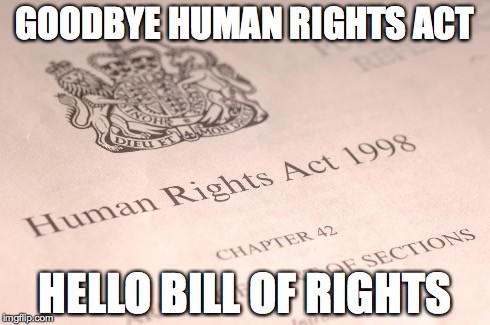British Bill of Rights (Sunday Times edition)
Last weekend, the Sunday Times obligingly published details of what was described as “a draft of the government’s blueprint to replace the Human Rights Act with a British bill of rights”. However, the details breathlessly disclosed suggested whoever had written or leaked details of the “blueprint” had no idea what they were really talking about. Indeed,… Continue reading
Last weekend, the Sunday Times obligingly published details of what was described as “a draft of the government’s blueprint to replace the Human Rights Act with a British bill of rights”. However, the details breathlessly disclosed suggested whoever had written or leaked details of the “blueprint” had no idea what they were really talking about.

Indeed, the more one hears about it, the less one really believes the government will actually change anything substantive in the Human Rights Act.
What was revealed suggested a few re-statements of the bleeding obvious, rather along the lines of that triumph of otiose legislation, the Social Action, Responsibility and Heroism Act 2015. Nevertheless, the article pumped it up mightily:
In the most radical shake-up of human rights law in two decades, judges will be told they will not have to follow rulings of the European Court of Human Rights in Strasbourg slavishly. Instead they would be able to rely on the common law — the body of judicial rulings built up in Britain over centuries — or rulings by courts in other Commonwealth countries such as Australia and Canada, when making their judgments.
Anyone who knows anything about the Human Rights Act knows that judges are not currently required slavishly or at all to follow the rulings of the Strasbourg court, and often don’t – a good example is the case of R v Horncastle [2009] UKSC 14 ; [2010] 2 AC 373, SC.
Moreover, nothing prevents the common law courts of England and Wales, if not also those of Scotland and Northern Ireland, from applying or taking cognisance of decisions of other common law jurisdictions around the globe – as, again, they frequently do (along with those of non common law jurisdictions as well, when appropriate).
Indeed, Lord Dyson MR has only last week given a speech (THE GLOBALISATION OF LAW) discussing this very matter.
So as well as stating the bleeding obvious on the citation of foreign authorities, what else does the Draft Bill of Rights (Sunday Times edition) hold out by way of “the most radical shake-up of human rights law in two decades”?
Well, it wants to sweep away the “victim culture” fomented by the “human rights industry” and “stamp out the courtroom compensation culture” which obviously has nothing to do with personal injury claims and other forms of private law tort litigation, but is all the fault of the Human Rights Act for providing that those whose rights have been wronged by public authorities may claim compensation.
The article also reveals that “ministers are considering enshrining the notion of parliamentary sovereignty explicitly in law.” That sounds like a constitutional measure, rather than one confined to human rights law, but it is also, as several commentators pointed out, somewhat tautological. It’s a bit like God declaring himself to be God, or the King claiming to rule by divine right. Parliament’s sovereignty comes not from its own laws, but from the democratic processes that give it legitimacy and the social contract that ensures, by and large, that any legislation it passes actually has some effect.
Apparently “There will be an explicit statement backing “freedom of expression” for the press,” which again is pretty well covered in the existing wording of section 12 of the HRA and Article 10 of the Convention.
The only things in the leaked draft that sound in the least bit radical are:
- a plan to limit the geographical scope of human rights protection to prevent it being used to claim in respect of the acts of state agents (such as the army) in foreign locations (this would also void its protection of serving soldiers, perhaps)
- a minimum or threshold level of seriousness below which claims would not be entertained by a court; and
- a cap on any compensation awarded.
But these are procedural or ancillary matters rather than changes in the substantive law, and in particular no change in the actual rights protected (derived from the European Convention) seems to have been proposed, nor has any current intention to withdraw from the Convention (as has previously been mooted). So,if anything, this document is a lot softer than what was talked up before the election, and suggests a sharpish application of the foot on the brake, if not (yet) a throwing of the gearstick into reverse.
This may well reflect the fact – revealed in a recent ComRes survey reported by ITV – that the British people have moved on from their tabloid induced obsession with human rights misuse and now “have little interest in scrapping the Human Rights Act”.
See: Public has little interest in scrapping Human Rights Act, poll shows
The draft has yet to be published, but when it is there will be period of consultation. It may be that this so-called leak was merely a way of preparing the public for its inevitable disappointment when that happens, or a rather forlorn attempt to rouse the public from its apathy on the topic in advance of concrete proposals. Either way, it seems a bit of a damp squib.
The image above was reproduced from the RightsInfo blog, which has also recently released this fabulous new animation about human rights: